- About Us
- Columns
- Letters
- Cartoons
- The Udder Limits
- Archives
- Ezy Reading Archive
- 2024 Cud Archives
- 2023 Cud Archives
- 2022 Cud Archives
- 2021 Cud Archives
- 2020 Cud Archives
- 2015-2019
- 2010-2014
- 2004-2009
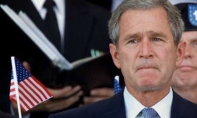 |
Ezy Reading: The Politics Of Irrelevance |
It is a truism that today’s newspaper wraps tomorrow’s fish, but perhaps this has become most abundantly clear in recent weeks in the case of one George W. Bush. 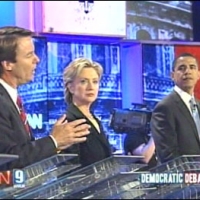 Some late-night channel surfing led me to a Daily Show interview on January 14th of this year, where Editor of Newsweek International, Fareed Zakaria, commented that there seemed to be little chance for any sort of positive result from Bush’s Middle East talks calling for renewed dialogue between Israel and Palestine. The main reason he cited for failure was because even if any such process was to now begin, within three months both American political parties will have chosen their own new candidates for the Presidency and “no-one is going to care what George Bush thinks.” Zakaria makes a strong point, but he’s actually being generous, because no-one seems to have cared much about what George Bush thinks for a good few months now, such is the concentrated political focus in the American media at the moment upon little else than the forthcoming election.
Some late-night channel surfing led me to a Daily Show interview on January 14th of this year, where Editor of Newsweek International, Fareed Zakaria, commented that there seemed to be little chance for any sort of positive result from Bush’s Middle East talks calling for renewed dialogue between Israel and Palestine. The main reason he cited for failure was because even if any such process was to now begin, within three months both American political parties will have chosen their own new candidates for the Presidency and “no-one is going to care what George Bush thinks.” Zakaria makes a strong point, but he’s actually being generous, because no-one seems to have cared much about what George Bush thinks for a good few months now, such is the concentrated political focus in the American media at the moment upon little else than the forthcoming election.
Obviously so long as Bush is in office and his finger has access to a red button of global annihilation he undoubtedly remains relevant, and yet it is striking that even with nearly a full year of his lame duck Presidency left on the books he has increasingly drifted out of the spotlight and even general discourse. Part of this is purely due to the nature of the extended, far-too-drawn out process of 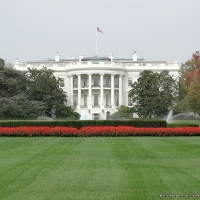 Presidential primary elections and caucuses that is sorely in need of reform and yet which garners daily news coverage. It is a costly, wasteful process in many respects, particularly when one considers that the demands of the current system mean that any potential candidate — who is generally a sitting lawmaker in term — is largely absent from his or her electorate for over a year while they divert attention to campaigning across America. In recent years the massive expansion of media coverage available for a Presidential campaign, from 24-hour cable news programming to the increased role of websites like Youtube.com in this election have also raised the profile of the process significantly.
Presidential primary elections and caucuses that is sorely in need of reform and yet which garners daily news coverage. It is a costly, wasteful process in many respects, particularly when one considers that the demands of the current system mean that any potential candidate — who is generally a sitting lawmaker in term — is largely absent from his or her electorate for over a year while they divert attention to campaigning across America. In recent years the massive expansion of media coverage available for a Presidential campaign, from 24-hour cable news programming to the increased role of websites like Youtube.com in this election have also raised the profile of the process significantly.
That said, there are few commentators that can recall there being this much focus on an election so early in the piece, dating back to 2005 and continuing forward. An expansive media (representing both sides of the political fence) is partly to blame, but the unpopularity of the Bush administration, the Iraq War, and the subsequent shift by Republican candidates to distance themselves from the President has certainly kept him on the sidelines. The benefits of having George Bush actively stump for a Republican nominee in the coming months are 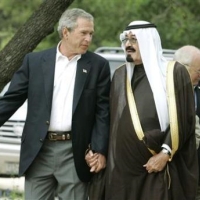 likely far outweighed by the negatives. Even Bush’s final State of the Union address, while televised on all the major network stations, received only what felt like cursory attention this year, especially as the major news of that day focused upon Senator Ted Kennedy’s endorsement of Barack Obama. It certainly appeared as if the major media commentators found it difficult to muster any real enthusiasm for what Bush had to say at a time when he already seems to be in the political rearview mirror and merely clutching for legacy trophies to tack onto his embattled Presidency.
likely far outweighed by the negatives. Even Bush’s final State of the Union address, while televised on all the major network stations, received only what felt like cursory attention this year, especially as the major news of that day focused upon Senator Ted Kennedy’s endorsement of Barack Obama. It certainly appeared as if the major media commentators found it difficult to muster any real enthusiasm for what Bush had to say at a time when he already seems to be in the political rearview mirror and merely clutching for legacy trophies to tack onto his embattled Presidency.
Bush’s Middle East visit was certainly open to easy criticism. It surely must have felt a tad rich among Israelis and Palestinians alike that the President now suddenly decided to show up in Israel some seven years deep into his term in office and merely call for ‘renewed dialogue’ between both parties. He did this without any sort of expression of a thorough, well-formulated American plan to peace or an appreciation for the practical realities involved, namely, that neither Israel’s Prime Minister Olmert nor Palestinian President Abbas possess the kind of unfettered, all-in-agreement blessing from their respective political peers to engage in dialogue at this time, and so the fighting rages on.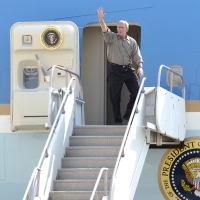
To then make open charges during an address in the United Arab Emirates against the lack of freedom and democracy in Iran while only hinting in platitudes (and without any direct mention) at the need for expansive liberties in nations like Egypt and beloved ally Saudia Arabia reeked of hypocrisy in the Bush administration’s inconsistent Middle East policy. The eight-day visit, regardless of one’s perception of George W. Bush’s actions as sincere or merely angling to save his future standing in the history books, was an utter failure. It represented exactly the kind of empty bluster that –a busy Presidential campaign in full flight or not- will continue keep Bush politically irrelevant in the few remaining months of his dying Presidency.
Ezy Reading is glad to be back for 2008! We welcome your comments at feedback@thecud.com.au
